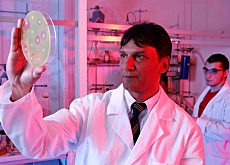
Roche spin-off plans float to fund drug trials

On the back of launching an extensive worldwide drug trial, biopharmaceutical start-up Arpida has announced its intention to float on the Swiss stock exchange (SWX).
The aim of the initial public offering (IPO), for which no date has yet been set, is to raise sufficient capital to pay for the trials of Iclaprim, the firm’s lead drug candidate.
Iclaprim targets skin and skin structure bacterial infections that are increasingly resistant to existing antibiotics.
Management at Arpida, which is based in Münchenstein near Basel, also suggested that the capital might be enough for it to take the drug to market, possibly in 2007.
The firm did not disclose details about the size of the float, its valuation, or the “lockup” periods for its venture capital backers following the IPO.
Typically, patients get the skin infections that Arpida is initially targeting while in hospital.
Although rare, the bacterial disease is expensive and difficult to treat. It can also be deadly, as bacteria tend already to have developed resistance to existing drugs.
Crowded market
Arpida says the trials of Iclaprim, which is a bactericide, are meant to demonstrate that it is significantly more potent than competing drugs.
Says CEO Khalid Islam: “It works faster and with fewer side effects.”
Being better than the competition will be key. Arpida faces a market that is increasingly crowded, according to life sciences stock analyst Olav Zilian at Helvea, an independent brokerage spun off from Geneva-based private bank Pictet.
Indeed, just a few kilometers away from Arpida’s lab is Basilea Pharmaceutica, which went public on the SWX two years ago.
Basilea has a drug candidate targeting the same market niche and is at a similar stage of development in testing.
But it is not Basilea that Arpida sees as its main rival, at least if the current trial is anything to go by.
The so-called Phase III trial is measuring the efficacy of Arpida’s new drug against Pfizer’s Zyvox. According to Islam, Zyvox brings Pfizer some $465 million (SFr553 million) in sales a year.
Going it alone?
Arpida says that, if it can raise enough capital in the IPO, it will maintain its “financial independence”.
This would give it the chance to set up its own marketing and sales organisation for Iclaprim, which would then be sold to hospitals rather than general practitioners.
The capital will be used to test an intravenous version, as well as a pill version of Icalprim. If successful, it hopes to launch the drug in 2007.
Without the capital, the firm would have to seek a pharmaceutical or biotechnology giant as a marketing and development partner for Iclaprim.
“It might be a bit early for an IPO. The value of biotech companies relies on the pipeline and at the moment Arpida is a one-drug company,” commented Zilian.
Arpida seemed prepared for such criticism. It spent some time during a press briefing on Monday describing AR-709, a compound aimed at a much wider market – the so-called community market for severe respiratory tract and inner ear infections.
No opting in
AR-709 is to move into animal testing, or Phase I trials, this year. Arpida said that it has 12 further candidates in its pipeline, but noted that all are in the pre-clinical phase.
The company is a spin-off of Hoffmann-La Roche, in the sense that Arpida’s founding team bought the molecule behind Iclaprim from Roche.
It also received start-up financing from a venture capital fund once owned by Roche, but since acquired by Zurich-based HBM Bioventures, a life science investment firm.
The terms of the agreement with Roche gave Arpida all rights to the intellectual property, but Roche is entitled to a share of royalties of between one and nine percent.
However, Roche does not have an option to take the drug back in-house to add to its own pipeline – so-called opt-in rights – as is the case with drugs being developed by other Roche spin-offs, including Basilea Pharmaceutica.
Arpida, which has 72 employees, has raised some SFr141 million in venture finance to date.
by Valerie Thompson

In compliance with the JTI standards
More: SWI swissinfo.ch certified by the Journalism Trust Initiative





























You can find an overview of ongoing debates with our journalists here . Please join us!
If you want to start a conversation about a topic raised in this article or want to report factual errors, email us at english@swissinfo.ch.